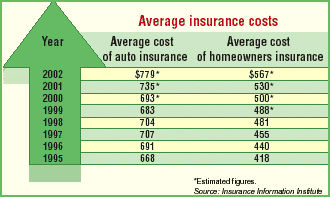Article
Financial Beat
Insurance, Mutual Funds, Real Estate, Investing, Identity Theft
Financial Beat
By Yvonne Chilik Wollenberg
Insurance: Expect to pay more this year for your auto and home policies
The average cost of car and homeowners insurance is expected to go up by 6 percent this year, says the Insurance Information Institute; the average auto policy is likely to rise by $45 per vehicle, and the average homeowners policy by $40. Insurance prices had stayed flat, or even dipped a little, for several years, but rising costs for medical care and vehicle repairs and escalating jury awards in auto accident cases are driving up premiums. The costs of home repairs, together with a high number of weather-related catastrophes, are to blame for the rate increase for homeowners insurance.
The most expensive states for car insurance are New Jersey, Washington, DC, New York, Massachusetts, and Delaware, says Insure.com, an Internet insurance information service.

Mutual Funds: Larger fund groups have costlier frills
If you buy shares in a midsize mutual fund company, with assets of $100 million to $2.5 billion, you're likely to pay less for some services than investors in large fund groups do, says a new study from Lipper, a financial research firm. Shareholder service expenses, which are part of the total fees paid by investors in all mutual funds, cover items such as telephone representatives, online research tools, and personalized performance statements.
Midsize firms tend to hold down expenses by hiring outside companies to handle these services, while larger firms generally provide the services themselves and also offer more expensive services, such as customer service representatives you can reach by phone 24 hours a day. The average shareholder, with $10,000 invested in a fund, paid about $28 for things such as customer service in 2001.
Real Estate: No hard times in the housing market
Home sales set a record in 2001, when more than 5 million existing homes traded owners, says the National Association of Realtors. Low mortgage rates helped fuel the buying surge. Mortgage rates averaged 6.97 percent last year, according to Freddie Mac, a government-chartered source of mortgage financing.
The median price for an existing home was $151,400 in December, up 8.4 percent from a year earlier. Median prices were $129,000 in the Midwest, $143,200 in the South, $154,000 in the Northeast, and $193,200 in the West. The median price for a new home was $170,200 nationwide, according to the US Department of Housing and Urban Development.
Investing: Hedge funds are shunned and poorly understood
Most affluent investors don't put their money in hedge funds or know much about them, says a new survey commissioned by Montgomery Partners, an alternative investments group. Only 7 percent of respondents with more than $1 million in net worth have invested in hedge funds, and only 17 percent said they understood hedge funds; 68 percent, on the other hand, said they understood mutual funds.
The survey results illustrate investors' confusion. Nearly half said hedge funds are very risky, but 38 percent thought they minimized investors' risk. In fact, hedge funds are not required to register with the Securities and Exchange Commission and so are free to use risky strategies to increase returns.
Identity Theft: Lots of crooks want to pretend they're you
Identity theft was the top consumer fraud in 2001, making up 42 percent of all complaints, says the Federal Trade Commission. Ten percent of the 200,000 complaints filed with FTC concerned Internet auctions, while another 7 percent were about other Internet and computer services. You can file a fraud complaint by calling the FTC at 877-382-4357 or by going to www.ftc.gov. To make a report about identity theft, call 877-438-4338.
The author is a freelance writer in Teaneck, NJ.
Yvonne Wollenberg. Financial Beat. Medical Economics 2002;6:17.





